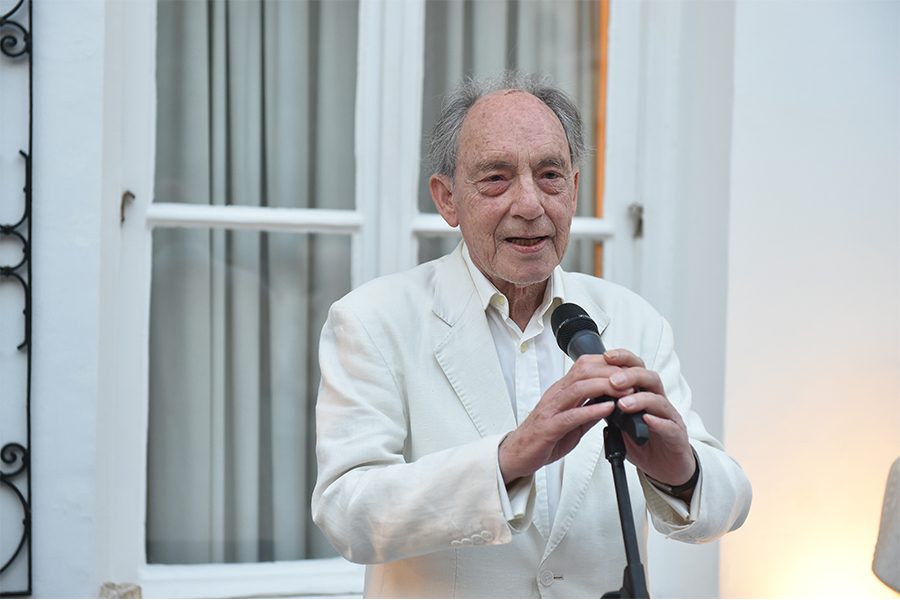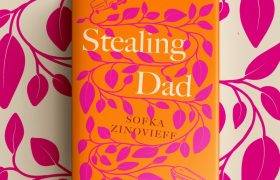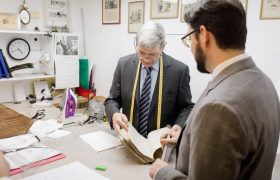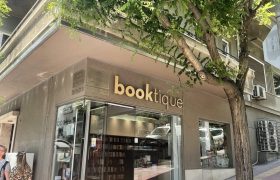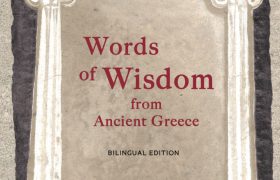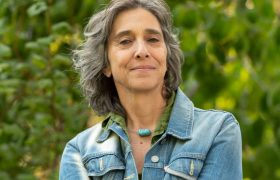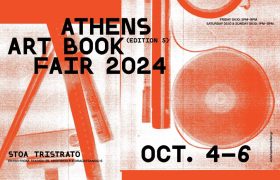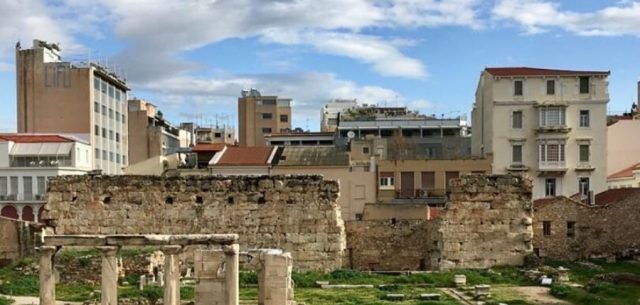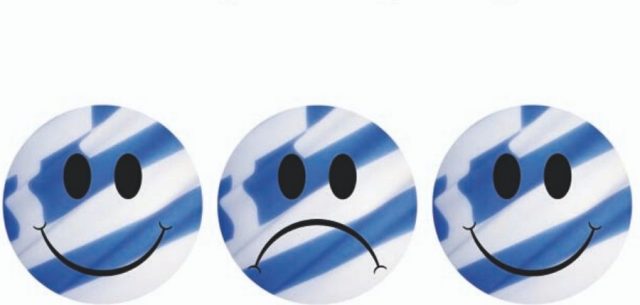Because I’m not yet cured of Happiness
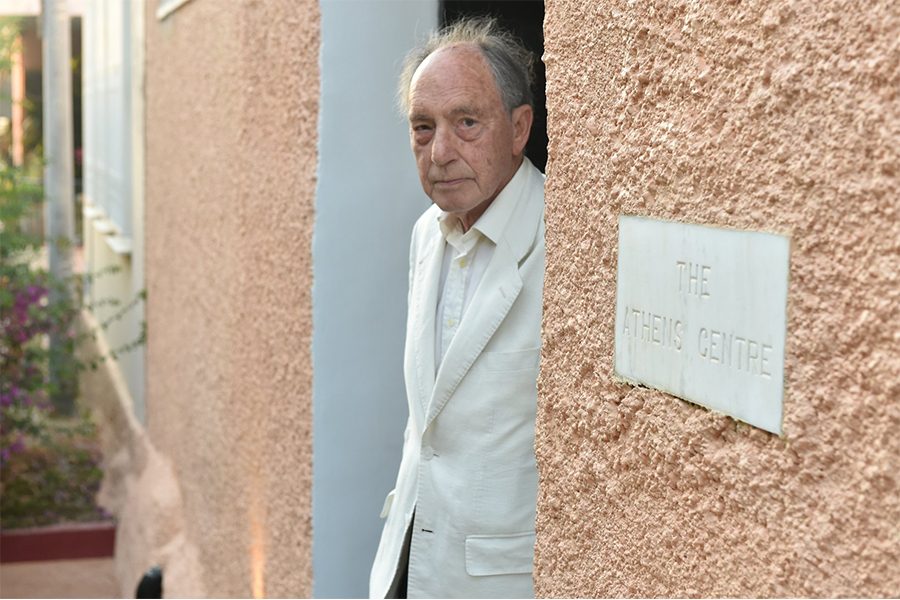
Yannis Zervos is probably Athens’ most colourful, entertaining story-teller, traversing continents and characters in his engaging prose. In Passage to Paradise, Hellenic Sketches of the Mind, so named for the delightfully appointed house and garden he grew up in, Zervos paints a vivid picture of life in post-war Greece and the incredibly eclectic talent it drew – from Beatnik poets to actors and academics – and peppers it with rare insight and dry wit. Karine Ancellin converses with the writer.
Going to interview Yannis Zervos in his elegant Marousi house, I am in awe of his simple yet imposing home. Trees and flowers dance harmoniously with the sun rays. That beautifully groomed patch of green radiates an aura of serenity, of complicit serendipity between man and trees. He presses his own olive oil, and collects his own pistachio nuts. No wonder his words are like paintbrushes, drawing a visual representation of every situation, however abstract the concept or philosophical the insight. Our interview is punctuated by beauty, suddenly Zervos gets up and shows me, hands-on, the wonder he is referring to, or laughs heartily.
You are a linguist who went on to become an academician, and you were part of the literary scene around the world. How did that happen?
I never imagined I would go down that route, but so many things change in one’s life. It is one thing to know about people and quite another to work with them. Over the years my interactions grew exponentially – some of these people became close friends; it was a constantly evolving scenario… and still is. During the Junta, I published a literary magazine, Omphalos, but I paid a heavy price for it. The editors got thrown out of Greece and I was continually harassed by the security forces for publishing ‘yellow press’. Katerina Anghelaki-Rooke was one of the editors and part of a poetic milieu which included Alan Ansen, Gregory Corso, Roger Green and others. Omphalos published three issues, then closed. It wasn’t easy with the political and financial pressures. The magazines have now become collectors’ items.
Languages are an inherent part of our lives and yet our usage and knowledge of them is minimal. My personal exposure, in addition to Greek, was German, English, French and Russian. Anyway, in Athens, I didn’t have a normal Greek upbringing, but I read a lot in English.
Greek has about 11 million registered words, the average person knows about 2000 words and actually uses just a couple of hundred in their daily affairs. Greek is a reflection of concepts and ideas and actions put to words. These ideas flowed into other languages and Greek linguistic roots abound worldwide.
Yannis Zervos, President of The Athens Centre welcoming foreign students
Considering the very many fields you worked in, it is intriguing to know what took you to the arts, and particularly to music and theatre?
My mother was a painter, but she was not interested in selling her paintings or showing them to anyone. I didn’t think very much of her paintings when I was a kid. I had seen other works by famous masters, as I was dragged around galleries, and didn’t think very much of them either. I got involved in the arts through old objects and old houses. I found an affinity in “objets trouvés” and beauty in things that were not necessarily artistic. I got to like engravings, particularly engravings on Greece made in the 16th or 17th century. Scottish painter, David Roberts’s engravings from Egypt (1796-1864) of felucca boats down the Nile have such intricate details, they reveal far more of a time and place than history books do. French painter Louis Dupré (1789 –1837), was known for his travels to Greece. They are incredible works of art detailing the landscape, what animals were around, how the people dressed, how they enjoyed passing their time. One of my favourite painters was Robert Dahnke, an Australian artist from Melbourne, a charming person working for the Greek architect Vikelas. Robert was a friend of the Kennedy family but died young in Switzerland. Along the way, I was exposed to music and theatre while arranging exhibits for my friends before the Aegina Arts Centre and from my radio days hosting a classical music programme. Over the years, I accumulated a lot of knowledge, and a lot of art, including Islamic art, sculptures, paintings, statuary and even a bronze baby rhino, now gracing the Athens Centre courtyard.
Was this your mission then, to give meaning to the people who visited Greece?
Not exactly. I had been so bored in school that I promised myself I would never do anything that was boring for people. At the Aegina Arts Centre, I tried to find people who knew how to turn people on – to poetry, to music, to ideas, to archaeology.
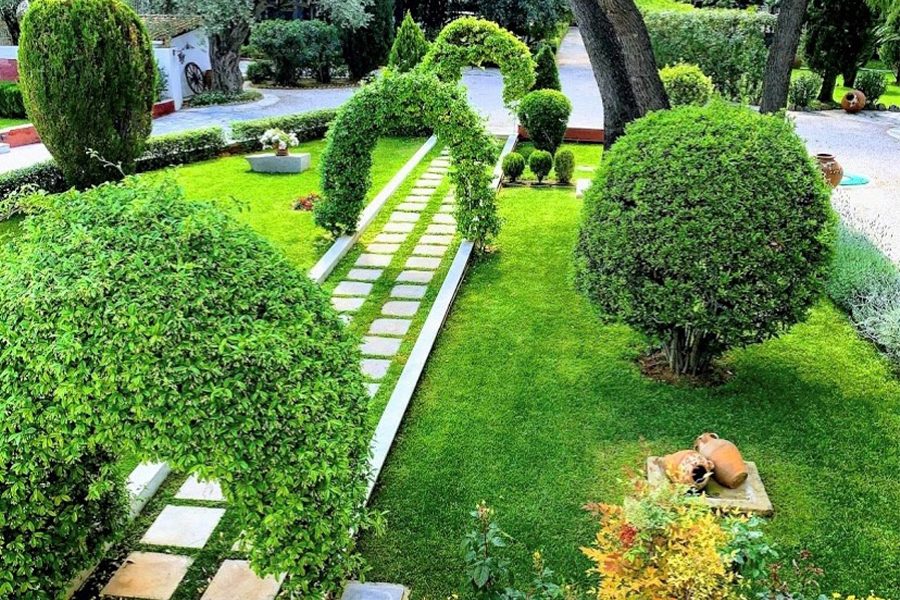
The immaculately-kept garden at the author’s home in Paradissou
Is this how the road to poetry paved itself for you?
My greatest exposure to poets was in Greece from the late ’60s into the ’90s, and all were surrounding Alan Ansen, Sinclair Beilis, Jimmy Merrill, Allen Ginsburg and others. There were not-so-well-known poets who came to read at the Centre, as well as accomplished, renowned poets like Alicia Stallings and Rachael Hadas. We had a long relationship with the Irish society and with Irish poets. One of my favourites was Desmond O’Grady. One of the best readings I attended was Marriage read by its author, Gregory Corso; he started his career in prison, came to Greece often, and was once summer poet-in-residence at the Athens Centre. One of the lines that stayed with me was “because I’m not yet cured of happiness” by Anna Akhmatova. I found Ritsos and Seferis seemed to stand out, enduring the trials of time. I also liked Katerina Anghelaki-Rooke, especially the way she read in Greek, with arresting empathy. Podium poetry is difficult, and requires other talents. Good presentations are an art form in themselves.
How do you figure you met such interesting people? Was it serendipitous?
Yes, I think everything is a chance from the minute you are born. I had an extraordinarily diverse family, with German heritage, an English side with interesting relatives, involved in politics, education and the arts. Aegina Arts Centre had started as an art workshop and developed into a cultural festival with musicians from the Julliard string quartet, the Metropolitan Opera, with Theodore Antoniou, probably one of Greece’s most accomplished composers. Antoniou had taught at Stanford University, he was also part of the Philadelphia Musical Academy for many years, then he worked for the Tanglewood Events at Harvard University, he was the first person using a Moog Synthesiser and also the first person who actually bought his hotel room in Philadelphia! (laughs). He introduced me to many composers and musicians in the field of atonal music, including Jani Christou, a prolific Greek composer.
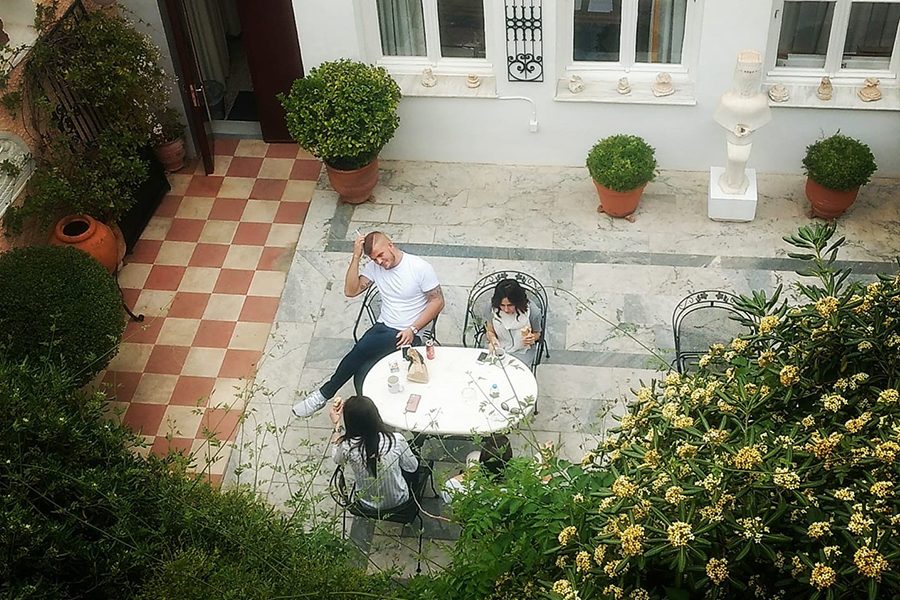
The Athens Centre in Mets
Give us an insight into your family and close friends.
My father was a potent right-wing anti-communist. He stood strongly by his views because the communists bombed our house here during the Greek Civil War. My father was a survivor and I admired his ability to adjust to the winds of war between 1940 -1949. Self-confidence is just a matter of looking at problems as challenges. My mother had a mind of her own. My parents were understated people who socialised because of their sport.
My father was one of the few Greeks who played golf at the time, along with a smattering of embassy personnel, and officers from the American base in Ellinikon. The club was owned by Onassis’ younger sister and her husband Patronikolas. They had a daughter my parents tried to marry me off with, I told them I was already married, but they said that doesn’t count you need a proper marriage! (laughs).
My first son, Christopher, worked as a US Naval aviator for 10 years, before attending Harvard Business School and later forming numerous successful start-ups in Silicon Valley. Now he devotes his time to photography. My middle son Alexis is a lawyer, went to Yale as an undergraduate, and to Cambridge for graduate studies, returning to Law School at Yale. He worked at a law firm Cravath Swaine and Moore, in New York and moved to the International Court at The Hague, working on the International Tribunal for Yugoslavia and Rwanda; then in Tanzania, Ivory Coast and is currently in the DRC. My daughter Anthea works in London for Open Society, a charity that supports worthwhile projects worldwide; she studied at Skidmore College in New York and at SOAS. She previously worked for a number of years in Sierra Leone, and Liberia in West Africa, with the World Bank and the American Bar Association.
I have a handful of 6 or 7 friends I often meet, and we go for a simple meal that costs 12,50 euros maximum in our neighbourhood taverna. All these people are incredibly successful but simple people. One of them invited me to his private museum – there were 80 immaculate cars of unique racing heritage!
I like understated people, who say less than they know, or show much less than what they have.
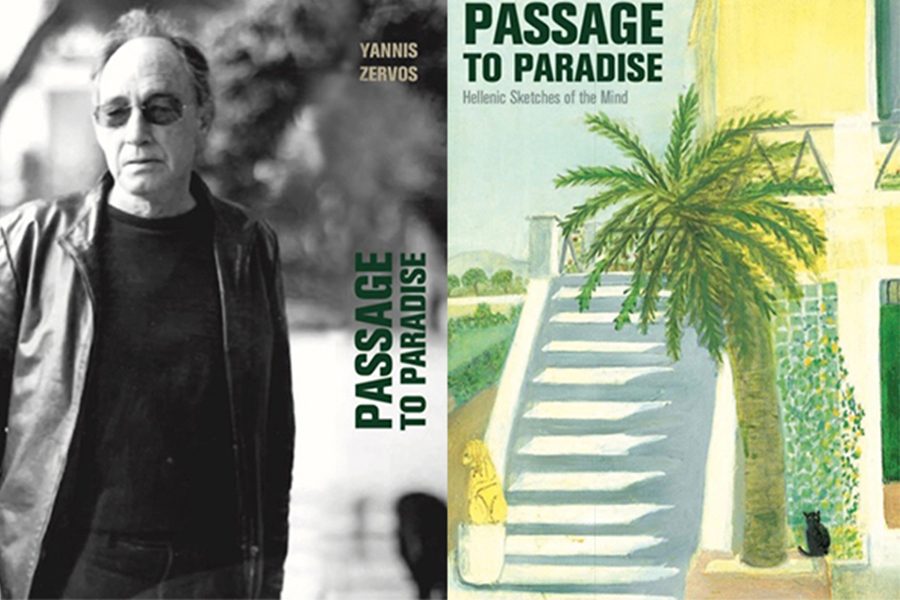
Where do you feel most at home?
I feel pretty comfortable in England. In the US I felt like a foreigner at first, but then I realised how privileged I was being white Anglo-Saxon. Everything in America was a matter of degrees. The country is made almost entirely of immigrants, the major companies Uber, Apple, Amazon, were founded by immigrants, yet immigration is a dirty word! I felt comfortable in India, even with their 300 plus languages! When you go to the movies there you have subtitles in 5 languages, you can barely see the screen.
What about politics?
I never had the energy or time to devote to politics, although at some point I ran for a seat in parliament. I worked for the City of Athens for 3 years involved with the cultural capitals in Europe. I like the present government and Mitsotakis in particular – he went to Harvard and worked for different companies my son worked with. The current Minister of Education was a colleague of my son Alexis, at the law firm ‘Cravath, Swaine and Moore,’ and like him, she went to Yale Law school.
You seem to be in tune with nature.
I talk to my trees and know every single plant growing here. I know how the birds communicate and I’ve learnt a lot and it’s made me a better person. I also pollute because I smoke, drive a car, take aeroplanes but I’m not Greta, ready to sail across the Atlantic. Nonetheless, there is no plastic in my house, there are no plastic water bottles, I don’t throw garbage in the dump. I take good care of my houses. I’m very Germanic in that way, keeping things organised, almost obsessively so.
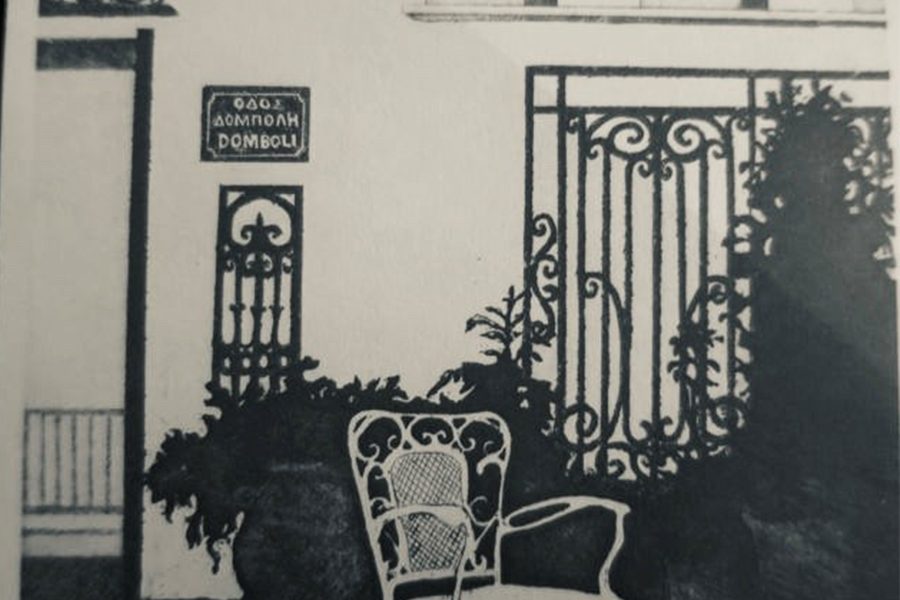
So, is there anything you dreamt you would do that you have not been able to achieve?
Well, I have regrets because I have met all these clever people who made such huge significant contributions and I didn’t do more. On the whole, it’s the other way around, there were things I did that I had not set out to do. I didn’t want to be ‘fulfilled’ because the moment you are fulfilled your life is finished. I don’t get up in the morning saying: “what am I going to do with my life?” I don’t even think about it.
How did you decide to write Passage to Paradise?
I wrote articles over the years for organisations and magazines. I wrote for ‘Revmata,’ The Athenian, articles about Greece in the Athens Centre Newsletter and Athens Insider Magazine. The book is mostly an accumulation of these articles.

